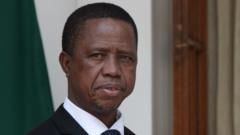As South Africa's coalition government faces turmoil over a contentious budget vote, the Democratic Alliance considers its future role while the African National Congress consolidates support from smaller parties.**
Tensions Rise in South Africa's Coalition Government Amid Budget Conflicts**

Tensions Rise in South Africa's Coalition Government Amid Budget Conflicts**
The fragile coalition between ANC and DA teeters as budget disputes expose deep political divides.**
South Africa's coalition government is under unprecedented strain following a pivotal vote on the national budget that has revealed stark divisions between its leading parties, the African National Congress (ANC) and the Democratic Alliance (DA). The DA, a centre-right party, opposed a key component of the budget concerning the fiscal framework, fueled by dissent over a proposed Value Added Tax (VAT) increase. The ANC, identifying as centre-left, rejected the DA's calls for austerity measures and rallied support from various smaller parties, successfully passing the budget with a margin of 194 to 182.
In response to the DA's protest against the vote, which they have labeled "procedurally flawed," they have initiated legal action while considering whether to continue their participation in what is described as a government of national unity (GNU). Political analysts like Professor William Gumede suggest that the DA is weighing its options carefully, contemplating whether to quit the coalition or wait for the court's decision on their challenge.
Formed less than a year ago, the coalition materialized in the aftermath of the ANC's first-ever election loss of its parliamentary majority since 1994. South African business leaders urged cooperation between the ANC and DA, seeing it as essential for economic stability. However, frustrations have since escalated, with DA spokesperson Willie Aucamp accusing the ANC of serious governance violations and stating, “The ANC refuses to share power.”
The ANC, in turn, accused the DA of betrayal, while also engaging its coalition partners, remaining steadfast despite the conflict. Notably, the relationship with the Inkatha Freedom Party has shifted as they joined the ANC in voting, signaling a breakdown of their past alliance with the DA. The situation became even more complicated as the DA found itself increasingly aligned with polarizing opposition parties, a scenario they criticize for its risk on the poor.
With the ANC facing public scrutiny over its handling of economic issues and service shortcomings, the DA seizes this moment to promote itself as "pro-poor." Meanwhile, looming economic threats complicate matters further—U.S. tariffs imposed alongside the budget disagreements signal a broader discontent and potential economic decline. Both political factions are under pressure to unite their efforts to stabilize a nation already grappling with soaring unemployment rates exceeding 30%.
For many, the emerging discord within the coalition government illustrates a critical juncture that could define South Africa's economic and political future.






















